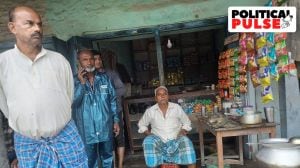Creative justice India: Judges often quote famous personalities or literary works in their verdicts to add authority, clarity and persuasive power to their reasoning. The intent is to simplify legalese and make judgments more relatable for both legal professionals and the general public.
The Supreme Court, of late, has mentioned some prolific literary wisdom in its orders, with Justice Dipankar Datta quoting a legal luminary, being the most recent.

Here are five instances where the top court quoted such literary works.
Story continues below this ad
“The final cause of law is the welfare of society”
Justice Dipankar Datta while on the bench with Justice Augustine George Masih quoted these lines of Benjamin N. Cardozo, a former associate justice of the Supreme Court of the United States, in October 28 verdict.
Justice Datta was hearing a POCSO case against a man who was charged for the rape of a minor girl but it was later learnt that she had married him and now has child. The man was challenging the criminal proceedings against him before the judge, who quashed the case.
He said though the law denied any reprieve to the man charged with the heinous crime, “ignoring the cry of the appellant’s wife for compassion and empathy will not, in our opinion, serve the ends of justice”.
“Even the most serious offenders of law do receive justice moderated by compassion from the courts, albeit in appropriate cases,” he added. Mentioning Cardozo’s lines as a prelude was Justice Datta’s way of defining the essence of the verdict, which ultimately held “law must yield to the cause of justice”.
Story continues below this ad
“At the bottom of all the tributes paid to democracy is the little man, walking into the little booth, with a little pencil, making a little cross on a little bit of paper—no amount of rhetoric or voluminous discussion can possibly diminish the overwhelming importance of that point.”
On March 6, Justice Sanjay Karol, while on the bench with Justice N Kotiswar Singh, quoted British statesman and former Prime Minister Winston Churchill to depict the significance of the electoral process in the democracy.
The court was hearing the matter related to suspected foul play in vote counting in the election of the gram pradhan in Uttar Pradesh’s Prayagraj district when Justice Karol pointed out that the court was not concerned with “who” is in power but “how” one got to power.
“This process has to be in accordance with constitutional principles and established norms – if not, then such a person has to be deprived of the power, and the decision-making by the people must begin once more,” he added.
Beginning the verdict with Churchill’s quotes, Justice Karol highlighted that each vote had its own value “irrespective of its effect in the final outcome of the election”.
Story continues below this ad
“The first thing we do, let’s kill all the lawyers.”
The rather startling quote from one the greatest plays of William Shakespeare’s — Henry VI, Part II, scene 2, Act IV — found a mention in the verdict of Justice K Vinod Chandran.
The judge began his verdict dated October 31 quoting the lines of the play’s character “Dick the Butcher”.
Justice Chandran, who authored the verdict, was on the bench along with Chief Justice B R Gavai and Justice N V Anjaria, hearing a suo moto case in which the investigating agencies summoned lawyers for advising their client.
The landmark ruling held that an advocate cannot be summoned by investigating agencies in a case involving their client unless it satisfies the exceptions laid out in the Bharatiya Sakshya Adhiniyam.
Story continues below this ad
Often spoken with a negative connotation, the judge noted that the context in which the words in Shakespearean play were spoken indicated it to be otherwise for the scene itself ends with a law clerk being sentenced to hang for being literate and informed in law.
The quote was meant to reflect the functions of a lawyer as a guardian of freedom.
“A torn jacket might soon be mended, but a bruised heart of a child would be beyond reviviscence.”
Former judge Justice C T Ravikumar, on the bench with Justice Sanjay Kumar, quoted American poet H W Longfellow while hearing a sexual assault case of a minor girl assaulted by her teacher.
The accused compromised with the survivor’s father which was revisited by the court pointing that the quashing of the FIR and all further proceedings solely on the ground that the accused and the complainant had settled the matter ‘invites interference’.
Story continues below this ad
“When an incident of the aforesaid nature and gravity allegedly occurred in a higher secondary school, that too from a teacher, it cannot be simply described as an offence which is purely private in nature and have no serious impact on the society,” Justices Ravikumar said on November 7, 2024.
Justice Ravikumar quoted the lines to highlight the harm caused to the child and the family members by the crime and its ever-lasting impact.
“…finality is a good thing, but Justice is better.”
Former judge Justice Sudhanshu Dhulia was one-half of the bench that delivered a split verdict in the Hijab case in 2022. He quoted the famous lines of Lord Atkin, one of the most influential judges of his time, to explain why he had chosen to disagree with his brother judge, retired Justice Hemant Gupta.
Though conscious of the fact that a Constitutional court “must speak in one voice” as split verdicts and discordant notes do not resolve a dispute and finality is not reached, Justice Dhulia penned a separate opinion on the important case.
Story continues below this ad
While Justice Gupta upheld the Karnataka government order validating the Hijab ban and said “it was only to promote uniformity and encourage a secular environment” in classrooms, Justice Dhulia said all that matters is the education of the girl child while setting aside the state and high court orders and called the right to wear the hijab in classrooms “a matter of choice”.

































